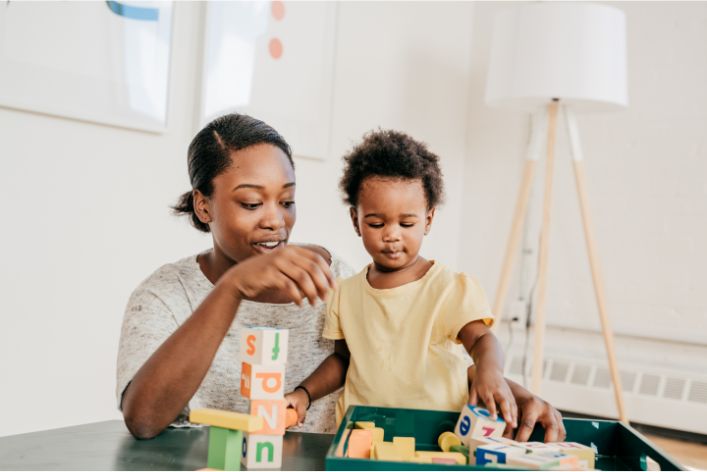Introduction
Harmonizing tradition and education in parenting is crucial to raising well-rounded individuals. In Nigeria, where tradition is highly valued, it can be challenging to strike a balance with modern education.
The Nigerian context presents unique challenges to smart parenting as parents strive to provide children with the best of both worlds. While traditional values are necessary for character building, education is the catalyst for a successful future.
Parents must find a way to harmonize these two elements to ensure their children have a solid foundation on which to build their future. It is essential to find a middle ground that fosters well-roundedness, character, and academic excellence.
Understanding Tradition in Nigeria
Tradition can be defined as the inherited beliefs, customs, and practices that shape the identity and culture of a particular community.
In Nigeria, there are various traditions that are peculiar to different ethnic groups across the country.
These traditions include:
- The Yoruba tradition, which is known for its rich cultural heritage and emphasis on respect for elders.
- The Igbo tradition, which places great importance on family values and responsibilities.
- The Hausa tradition, which is largely influenced by Islam and places a high value on hospitality and community.
- The Fulani tradition, which emphasizes the importance of animal husbandry and pastoralism.
Tradition plays a significant role in parenting in Nigeria. Parents are expected to uphold the values and customs of their respective ethnic groups while raising their children.
For instance, in the Yoruba culture, parents are expected to teach their children to greet elders in a respectful manner and to imbibe cultural values such as honesty, hard work, and humility.
In Igbo culture, parents are expected to teach their children the importance of upholding family values such as loyalty, respect, and responsibility.
In Hausa culture, parents are expected to teach their children the importance of community and hospitality.
However, tradition can sometimes conflict with modern education practices. This is particularly true in Nigeria, where Western education has become the norm in most parts of the country.
Parents often find themselves torn between upholding tradition and giving their children the best education possible. This is where smart parenting comes in.
Read: Cultivating Creativity: A Parent’s Role in Nigerian Education
Education in Nigeria
Education in Nigeria is key to development and growth. It is a tool for empowerment and eradication of poverty.
The Nigerian education system comprises of six years of primary education, three years of junior secondary education, three years of senior secondary education, and tertiary education.
Challenges Faced by Parents and Educators in Nigeria
- Poor funding of education by the government which affects the quality of education offered
- Inadequate infrastructure in schools leading to overcrowded classrooms, lack of furniture, inadequate learning materials, and poor sanitation
- Lack of qualified teachers due to low salaries and poor conditions of service leading to a high number of unqualified teachers in schools
- Illiteracy, poverty, and cultural beliefs that hinder some parents from enrolling their children in school
- The prevalence of child labor and early marriages that lead to children dropping out of school
The Importance of Education for Children in Nigeria
Education is fundamental to achieving the Sustainable Development Goals (SDGs) in Nigeria. It is a right for every child, and parents and educators must work together to ensure their children have access to quality education.
Parenting Made Just for You
Get personalized Parenting Solutions tailored to your child’s needs. Transform your parenting journey with expert guidance in 1-3 days.
Get Started- Education helps to reduce poverty and promotes economic growth and development.
- It is a tool for empowering individuals to participate in decision-making processes and in the development of their communities.
- Education is the foundation for preparing individuals for the world of work and for acquiring relevant skills and knowledge necessary for a productive life.
- It helps to promote social cohesion and peaceful co-existence among diverse communities in Nigeria by fostering mutual respect and understanding.
Parents play a vital role in ensuring the education of their children. They should provide a supportive environment for their children at home, encourage them to attend school regularly, and participate in school activities.
Educators, on the other hand, should be passionate about their work, inspire their students, and provide relevant materials to aid learning.
Additionally, the government and education sector stakeholders should prioritize education by allocating sufficient funding, enhancing school infrastructure, employing qualified teachers, and implementing policies to encourage parental school enrollment.
In general, education is critical to the growth and development of Nigeria, and it is the responsibility of parents, educators, and the government to ensure that children have access to quality education.
The challenges faced by the education sector can be addressed through concerted efforts, and Nigeria can achieve its full potential if the right investments are made in the education of its citizens.
Read: Overcoming Hurdles: A Guide to Special Education in Nigeria

Harmonizing Tradition and Education in Parenting
Harmonizing tradition and education in parenting is crucial because it ensures that parents impart values and morals alongside formal education.
Education is essential, but it is incomplete without instilling cultural heritage and values. As a result, children grow up with a strong sense of identity and remain connected to their roots.
Examples of How Tradition and Education Can Work Hand-In-Hand
- Teaching African literature in schools allows children to learn about their culture, history, and language.
- Encouraging children to participate in traditional activities fosters a sense of belonging and acceptance of cultural diversity.
- Integrating cultural celebrations, such as festivals and holidays, into the school curriculum promotes an appreciation of diverse cultures.
Challenges of Harmonizing Tradition and Education in Nigeria
- Inadequate educational resources, such as textbooks, limit the extent to which schools can teach culture and tradition.
- Some parents may undervalue the importance of tradition in education and focus solely on formal education.
- Language barriers may exist, making it difficult for non-native speakers to impart culture and tradition to their children.
- Westernization and globalization trends may influence young people to adopt foreign cultures and erase traditional values.
Despite these challenges, parents can still harmonize tradition and education in parenting by incorporating culture and tradition in various ways.
They can seek out cultural events, museums, and traditional organizations that can teach children about their heritage. Parents can also pass down traditions through storytelling, music, and dance.
Additionally, inclusive and diverse schools can offer classes that promote cultural education and celebrate diversity.
In fact, harmonizing tradition and education in parenting is vital to ensure that children grow up with a sense of identity and appreciation for cultural diversity.
While there may be challenges, parents and communities can work together to instill traditional values alongside formal education.
Read: The Nigerian Education Landscape: A Parent’s Roadmap
Unveil the Perfect Name that Tells Your Family's Story
Let us help you find a name that embodies your family's values, traditions, and dreams. Our personalized consultation weaves cultural insights to create a name that's uniquely yours.
Get StartedSmart Parenting in Nigeria
Parenting in Nigeria is a delicate balance between tradition and education.
While it is important to hold onto cultural values, it is equally important to equip our children with the skills and knowledge they need to succeed in a rapidly changing world. This is where smart parenting comes in.
Definition of Smart Parenting
Smart parenting is about finding the right balance between providing our children with a strong foundation in their culture and traditions, while also preparing them for the challenges of the modern world.
It involves being intentional and proactive in our parenting approach, and making informed decisions that will benefit our children in the long run.
How to be a Smart Parent in Nigeria
Here are some best practices for smart parenting in Nigeria:
- Be involved in your child’s education: Attend parent-teacher conferences, volunteer at school events, and help with homework. This will show your child that you value their education and it will also help you stay informed about their progress.
- Encourage a love for learning: Cultivate a curiosity in your child by exposing them to different experiences and encouraging them to ask questions. Teach them that learning is fun and that it is a lifelong process.
- Set boundaries: Children need structure and boundaries. Make sure you set clear rules and consequences for your child’s behavior. This will help them understand what is expected of them and will also help them feel safe and secure.
- Be a positive role model: Children learn by example, so it is important to model the kind of behavior you want your child to emulate. Be kind, honest, and respectful in your interactions with others.
- Communicate effectively: It is important to establish open communication with your child. Encourage them to express their thoughts and feelings, and listen attentively when they do. This will help them feel heard and valued.
- Emphasize the importance of culture: Teach your child about their cultural heritage and help them develop a sense of pride in their identity. This will help them understand where they came from and will also give them a sense of belonging.
Best Practices for Harmonizing Tradition and Education in Parenting in Nigeria
One of the biggest challenges of parenting in Nigeria is balancing tradition and education. Here are some best practices to help you harmonize the two:
- Blend cultural traditions with modern education: Find ways to incorporate cultural practices and traditions into your child’s education. For example, you could teach them about the history and traditions of their ethnic group or involve them in cultural festivals and events.
- Teach critical thinking skills: In a rapidly changing world, children need to be able to think critically and solve complex problems. Encourage your child to question things and help them develop analytical skills.
- Emphasize the value of education: Education is key to success in the modern world. Help your child understand the value of education and encourage them to take their studies seriously.
- Expose your child to different cultures: Nigeria is a diverse country with many different ethnic groups and cultures. Expose your child to different cultures and help them develop an appreciation for diversity.
- Encourage creativity: Creativity is a valuable skill that can help your child succeed in life. Encourage them to pursue their interests, whether it is through music, art, or other forms of creative expression.
Smart parenting in Nigeria requires a careful balance between tradition and education. By following the best practices outlined above, you can help your child thrive in a rapidly changing world while also holding onto your cultural values and traditions.
Read: Educating Parents: Navigating School Challenges in Nigeria
Conclusion
Recognizing the significance of blending tradition and education, it becomes apparent that this approach is crucial for a child’s well-being.
Parents can raise well-rounded and successful children by combining Nigerian cultural values with modern education. As parents, it is our responsibility to equip our children with the necessary tools for thriving in any environment.
This necessitates striking a balance between upholding cultural traditions and embracing the advantages of education. By doing so, we prepare our children for future challenges and opportunities.
Essentially, smart parenting in Nigeria is about harmonizing tradition and education. It is about recognizing the strength of our cultural values and utilizing them to reinforce the lessons of learning. As we strive to build a better future for our children, let us remember to start from the foundation- their upbringing.
We must be intentional in our parenting approach and ensure that we pass on the best of both worlds to our children. By doing so, we can rest assured that we are raising individuals who will make Nigeria proud.
Let us, therefore, take action today and make a conscious effort to harmonize tradition and education in our parenting approach. Our children deserve nothing but the best.




